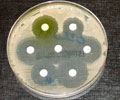Pathogens can evolve to become more virulent without increasing their rate of replication. Pathogen virulence and replication rates can evolve separately, stated new study.

TOP INSIGHT
Pathogens can evolve to become more virulent without increasing their rate of replication.
The research examined the spread of bacteria called Mycoplasma gallisepticum among house finches - a rare example of a well-studied host-bacteria evolution where humans have not intervened with antibiotics or vaccines.
"We actually have a very poor understanding of how pathogens evolve in response to natural host resistance," said Dr Camille Bonneaud, of the Centre of Ecology and Conservation on Exeter's Penryn Campus in Cornwall.
"This is because there are very few systems in the wild that have been monitored in sufficient detail, without being subjected to human intervention.
"We typically assume that pathogens respond to host resistance (including to vaccines) by increasing their rate of replication, allowing them to transmit faster to other hosts before they are cleared by their current host.
The authors say this could lead to new approaches for tackling pathogens.
Some populations of house finches have been exposed to Mycoplasma gallisepticum for more than 20 years, while others have not - and have therefore not developed resistance.
In the study, carried out in Arizona and supported by Arizona State University and Auburn University, 57 finches from previously unexposed populations were exposed to the pathogen.
The findings show virulence has increased consistently over more than 150,000 bacterial generations since outbreak (1994 to 2015).
By contrast, while replication rates increased from outbreak to the initial spread of resistance (1994 to 2004), no further increases have occurred subsequently (2007 to 2015).
Source-Eurekalert
 MEDINDIA
MEDINDIA




 Email
Email








